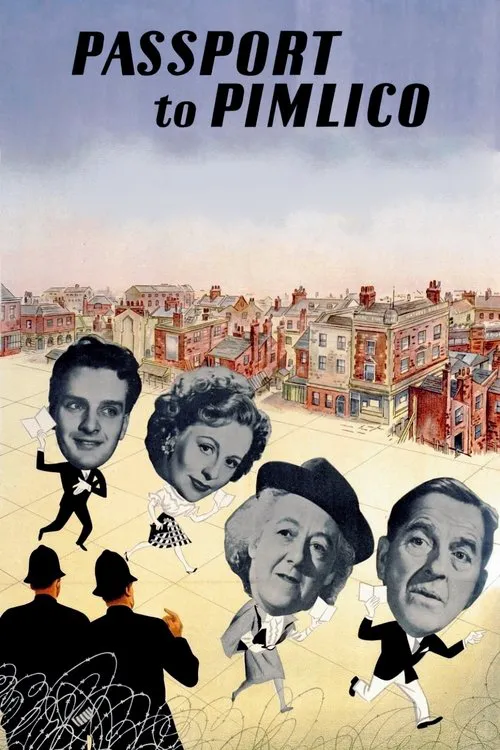Passport to Pimlico

Plot
The sun had barely risen over the sleepy London suburb of Pimlico, but the streets were already abuzz with the news that had been spreading like wildfire throughout the night. An unexploded World War II bomb had been detonated, releasing a shower of sparks and debris into the morning air. As residents emerged from their homes to survey the damage, they were amazed to discover a strange set of documents buried beneath the rubble. Among the debris, a small group of residents stumbled upon an old chest filled with dusty papers, gold coins, and a map that appeared to be hand-drawn. As they began to examine the contents, it became clear that this was no ordinary treasure trove. Instead, the documents revealed a shocking truth: Pimlico was not, in fact, a part of the United Kingdom, but rather a long-forgotten region of Burgundy, France. As word of the discovery spread, the residents of Pimlico were initially skeptical, thinking that it was some sort of joke. But as they looked closer at the documents, they realized that the claims were legitimate – and that, according to international law, the region was now technically a foreign territory. The news sent shockwaves through the community, with some residents reveling in their newfound "foreign" status, while others were more cautious, unsure of what this meant for their lives. Meanwhile, the British government was swift to respond to the news, sending a team of officials to Pimlico to assess the situation. As they arrived, they were met with a mixture of confusion and defiance. The authorities attempted to impose order, setting up border controls and warning residents that services such as electricity and water would be cut off unless they were willing to adhere to British law. The residents of Pimlico, however, were having none of it. Armed with a newfound sense of national pride and a determination to assert their independence, they refused to back down. Led by a gruff but lovable local butcher named Mr. Wickett and a young woman named Elizabeth Maudsley, the residents formed a committee to negotiate with the authorities and assert their rights as citizens of France. As the standoff between Pimlico and the British government escalated, the town became a flashpoint in the post-war British psyche. Some people saw the residents as stubborn, hard-headed, and intransigent, while others sympathized with their desire for independence and self-determination. As the days turned into weeks, the situation in Pimlico became increasingly volatile, with protests and demonstrations erupting in the streets. Despite the chaos, the residents of Pimlico remained resolute, determined to assert their rights as French citizens. They held mock French parades, set up a makeshift French embassy, and even began to construct a miniature Eiffel Tower in the town square. As the British government struggled to find a solution, the residents of Pimlico became embroiled in a series of clever and humorous skirmishes, outwitting officials at every turn. Meanwhile, the British government was struggling to find a way to resolve the crisis. As the authorities tried to impose order, they were met with resistance at every turn. In a bizarre series of events, the government's officials were thwarted by everything from a French-language radio broadcast to a hastily constructed makeshift border, complete with a sign reading "Pimlico: Zone Française." As the standoff continued, the residents of Pimlico found themselves caught in a surreal and farcical battle of wills with the British government. But as the days turned into weeks, it became clear that the residents were not just fighting for their rights as French citizens – they were also fighting for a sense of identity, community, and self-expression. As the dust finally began to settle, the residents of Pimlico emerged victorious, their defiance and determination having won them a reprieve from the British authorities. While the question of Pimlico's status remained unresolved, the town had, in many ways, become a symbol of resistance against the stifling conformity of post-war Britain. As the townspeople celebrated their hard-won freedom, they knew that, regardless of the outcome, they had won something far more valuable – a sense of pride, purpose, and national identity.
Reviews
Recommendations




